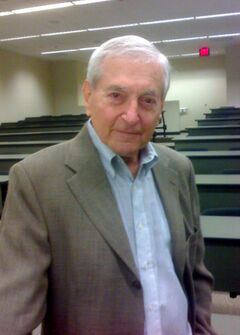
| Version | Summary | Created by | Modification | Content Size | Created at | Operation |
|---|---|---|---|---|---|---|
| 1 | Conner Chen | -- | 742 | 2022-11-14 01:19:58 | | | |
| 2 | Conner Chen | Meta information modification | 733 | 2022-11-15 05:10:01 | | |
Video Upload Options
1. Introduction
Wolfgang Rindler (18 May 1924 – 8 February 2019) was a physicist working in the field of General Relativity where he is known for introducing the term "event horizon", Rindler coordinates, and (in collaboration with Roger Penrose) for popularizing the use of spinors in general relativity. An honorary member of the Austrian Academy of Sciences and foreign member of the Accademia delle Scienze di Torino,[1] he was also a prolific textbook author.
2. Life and Career
Wolfgang Rindler was the son of a lawyer. Because of his Jewish ancestry, he fled before the Nazis to England in the course of the so-called Kindertransport in 1938. Rindler gained his B.Sc. and M.Sc. from the University of Liverpool and his PhD from Imperial College London. In 1956 he was at Cornell University.
In 1960 Oliver & Boyd and InterScience published his first book on special relativity. Reviewer Alfred Schild said it was an "excellent, clear and concise account" and "provided a sound balance between physical ideas, analytical formulae and space-time geometry".[2] (1966, second edition)
In 1961 Rindler used the Fitzgerald contraction as the premise of his article "Length contraction paradox".[3] The thought experiment is now called the ladder paradox.
Starting in 1963 he began teaching at the newly-founded Southwest Center for Advanced Studies, later called University of Texas at Dallas, where he was professor emeritus. He was visiting scholar at King's College London (1961/62), at the University La Sapienza in Rome (1968/69),
In 1969 Springer published the first edition of his Essential Relativity: Special, General, and Cosmological. The undergraduate textbook was lauded as a "refreshingly modern approach to the critical problem of teaching relativity theory."[4] Another reviewer said it is "simply the best introduction" and is "filled with fabulous insights."[5] When the second edition appeared in 1977 a reviewer noted its treatment "reminiscent of Mach's celebrated examination of the foundations of classical mechanics". On the other hand, the second edition "gives the barest hints of new developments" (models of neutron stars, in X-ray astronomy, supernova explosions, and quasars).[6] Later, another reviewer criticized it for the paucity of diagrams, but lauded the chapter on cosmology as "lyrical, philosophical, yet technical."[7]
Rindler was visiting scholar at the University of Vienna (1975, 1987) and at the Cambridge University (Churchill College, 1990).
In 1982 Oxford University Press published Introduction to Special Relativity, with the second edition in 1991. A reviewer noted that other books provide a better introduction and intuitive understanding, but that it "should provide a useful reference for most applications of special relativity: kinematics, optics, particle mechanics, electromagnetism and mechanics of continua."[8]
In 1984 Roger Penrose and Rindler published Spinors and Spacetime, volume 1, on "two-spinor calculus and relativistic fields". Michał Heller wrote that Spinors and Spacetime "is both elementary and highly advanced. It begins on an almost graduate level but soon, step by step, reaches the highest standards of modern mathematical physics."[9]
In 2001 Oxford University Press published Relativity: Special, General and Cosmological, with a second edition in 2006. A reviewer noted "His writing is elegant, yet compact and logically precise." He was impressed with the "discussion of the internal structure of black holes analyzed first in Schwarzschild coordinates, and then in a masterful treatment of the Kruskal extension."[10]
Wolfgang Rindler died at the age of 94 on 8 February 2019.[11]
3. Articles
Rindler published several articles in The American Journal of Physics (AJP):
- 1961: (with D. W. Sciama) "Radiation Pressure on a Rapidly Moving Surface", AJP 29:643 doi:10.1119/1.1937874
- 1965: (with Roger Penrose) "Energy conservation as the basis for relativistic mechanics", part 1 AJP 33:55 doi:10.1119/1.1971232 and part 2 AJP 33:995 doi:10.1119/1.1971205
- 1966: "What are spinors", AJP 34:937 doi:10.1119/1.1972301
- 1966: "Kruskal space and the uniformly accelerated frame", AJP 34:1174 doi:10.1119/1.1972547
- 1967: "The World’s fastest way to get the relativistic time-dilation formula", AJP 35:1165 doi:10.1119/1.1973819
- 1968: "A counterexample to the Lenz-Schiff argument", AJP 36:540 doi:10.1119/1.1974967
- 1969: "A counterexample to the Tangherlini argument", AJP 37:72 doi:10.1119/1.1975414
- 1970: "Einstein’s priority in recognizing time dilation physically", AJP 38:1111 doi:10.1119/1.1976561
- 1988: (with Jack Denur) "A simple relativistic paradox about electrostatic energy", AJP 56:795 doi:10.1119/1.15487
- 1989: "Relativity and electromagnetism: The force on a magnetic monopole", AJP 57:993 doi:10.1119/1.15782
- 1994: "General relativity before special relativity: an unconventional overview of relativity theory", AJP 62:887 doi:10.1119/1.17734
- 2009: "Gödel, Einstein, Mach, Gamow, Lanczos: Gödel’s remarkable excursion into cosmology", AJP 77:498 doi:10.1119/1.3086933
References
- "Wolfgang A. Rindler". University of Texas – Dallas. https://explorer.utdallas.edu/editprofile.php?pid=13580&onlyview=1. Retrieved 8 November 2017.
- Alfred Schild (1961) Review: Special Relativity, Bulletin of the American Mathematical Society 67(5):449,50 link from Project Euclid https://projecteuclid.org/euclid.bams/1183524311
- Rindler, Wolfgang (1961). "Length Contraction Paradox". American Journal of Physics 29 (6): 365–366. doi:10.1119/1.1937789. Bibcode: 1961AmJPh..29..365R. https://dx.doi.org/10.1119%2F1.1937789
- Kenneth Jacobs (1970) "Bridging the gap between relativity and the undergraduate", Physics Today 23(12):48,8 doi:10.1063/1.3021868 https://doi.org/10.1063%2F1.3021868
- Chris Hllman (1998) Are there any good books on relativity ? from University of California, Riverside http://math.ucr.edu/home/baez/physics/Administrivia/rel_booklist.html
- Hans C. Ohanian (1977) "Review: Essential Relativity: Special, General, Cosmological, second edition", American Journal of Physics 45:1235 doi:10.1119/1.10693 https://doi.org/10.1119%2F1.10693
- Daniel Greenberger (1983) "Review: Essential Relativity, second edition", American Journal of Physics 51:94 doi:10.1119/1.13409 https://doi.org/10.1119%2F1.13409
- Lyle Hoffman (1984) "Review: Introduction to Special Relativity", American Journal of Physics 52:285 doi: 10.1119/1.13719 https://doi.org/10.1119%2F1.13719
- Michał Heller (1985) Review: Spinors and Spacetime, volume 1, Acta Cosmologica 14: 143,4 from Astrophysics Data System http://articles.adsabs.harvard.edu//full/1986AcC....14..143P/0000144.000.html
- Donald Salisbury (2003) "Review: Relativity: Special, General, Cosmological", American Journal of Physics 71:1085 doi:10.1119/1.1622355 https://doi.org/10.1119%2F1.1622355
- Wolfgang Rindler, founding faculty member from University of Texas at Dallas https://www.utdallas.edu/news/faculty/ut-dallas-remembers-founding-faculty-member-wolfgang-rindler/

Location: Vienna, Austria




